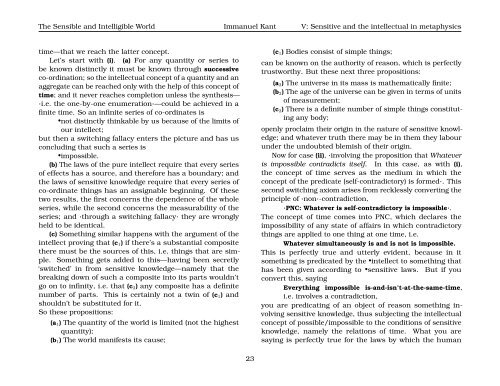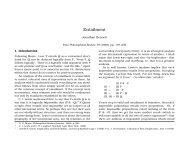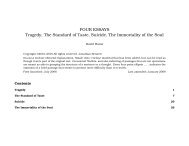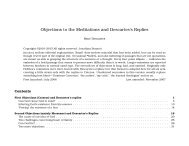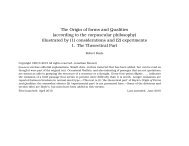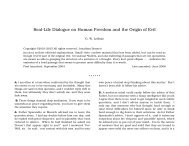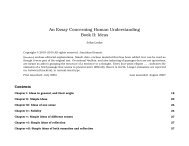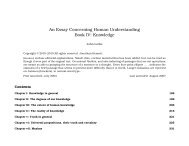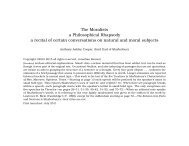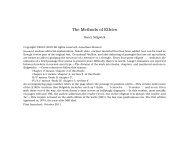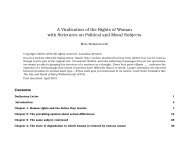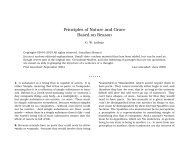The Form and Principles of the Sensible and Intelligible World
The Form and Principles of the Sensible and Intelligible World
The Form and Principles of the Sensible and Intelligible World
Create successful ePaper yourself
Turn your PDF publications into a flip-book with our unique Google optimized e-Paper software.
<strong>The</strong> <strong>Sensible</strong> <strong>and</strong> <strong>Intelligible</strong> <strong>World</strong> Immanuel Kant V: Sensitive <strong>and</strong> <strong>the</strong> intellectual in metaphysics<br />
time—that we reach <strong>the</strong> latter concept.<br />
Let’s start with (i). (a) For any quantity or series to<br />
be known distinctly it must be known through successive<br />
co-ordination; so <strong>the</strong> intellectual concept <strong>of</strong> a quantity <strong>and</strong> an<br />
aggregate can be reached only with <strong>the</strong> help <strong>of</strong> this concept <strong>of</strong><br />
time; <strong>and</strong> it never reaches completion unless <strong>the</strong> syn<strong>the</strong>sis—<br />
·i.e. <strong>the</strong> one-by-one enumeration·—could be achieved in a<br />
finite time. So an infinite series <strong>of</strong> co-ordinates is<br />
•not distinctly thinkable by us because <strong>of</strong> <strong>the</strong> limits <strong>of</strong><br />
our intellect;<br />
but <strong>the</strong>n a switching fallacy enters <strong>the</strong> picture <strong>and</strong> has us<br />
concluding that such a series is<br />
•impossible.<br />
(b) <strong>The</strong> laws <strong>of</strong> <strong>the</strong> pure intellect require that every series<br />
<strong>of</strong> effects has a source, <strong>and</strong> <strong>the</strong>refore has a boundary; <strong>and</strong><br />
<strong>the</strong> laws <strong>of</strong> sensitive knowledge require that every series <strong>of</strong><br />
co-ordinate things has an assignable beginning. Of <strong>the</strong>se<br />
two results, <strong>the</strong> first concerns <strong>the</strong> dependence <strong>of</strong> <strong>the</strong> whole<br />
series, while <strong>the</strong> second concerns <strong>the</strong> measurability <strong>of</strong> <strong>the</strong><br />
series; <strong>and</strong> ·through a switching fallacy· <strong>the</strong>y are wrongly<br />
held to be identical.<br />
(c) Something similar happens with <strong>the</strong> argument <strong>of</strong> <strong>the</strong><br />
intellect proving that (c1) if <strong>the</strong>re’s a substantial composite<br />
<strong>the</strong>re must be <strong>the</strong> sources <strong>of</strong> this, i.e. things that are simple.<br />
Something gets added to this—having been secretly<br />
‘switched’ in from sensitive knowledge—namely that <strong>the</strong><br />
breaking down <strong>of</strong> such a composite into its parts wouldn’t<br />
go on to infinity, i.e. that (c2) any composite has a definite<br />
number <strong>of</strong> parts. This is certainly not a twin <strong>of</strong> (c1) <strong>and</strong><br />
shouldn’t be substituted for it.<br />
So <strong>the</strong>se propositions:<br />
(a1) <strong>The</strong> quantity <strong>of</strong> <strong>the</strong> world is limited (not <strong>the</strong> highest<br />
quantity);<br />
(b1) <strong>The</strong> world manifests its cause;<br />
23<br />
(c1) Bodies consist <strong>of</strong> simple things;<br />
can be known on <strong>the</strong> authority <strong>of</strong> reason, which is perfectly<br />
trustworthy. But <strong>the</strong>se next three propositions:<br />
(a2) <strong>The</strong> universe in its mass is ma<strong>the</strong>matically finite;<br />
(b2) <strong>The</strong> age <strong>of</strong> <strong>the</strong> universe can be given in terms <strong>of</strong> units<br />
<strong>of</strong> measurement;<br />
(c2) <strong>The</strong>re is a definite number <strong>of</strong> simple things constituting<br />
any body;<br />
openly proclaim <strong>the</strong>ir origin in <strong>the</strong> nature <strong>of</strong> sensitive knowledge;<br />
<strong>and</strong> whatever truth <strong>the</strong>re may be in <strong>the</strong>m <strong>the</strong>y labour<br />
under <strong>the</strong> undoubted blemish <strong>of</strong> <strong>the</strong>ir origin.<br />
Now for case (ii), ·involving <strong>the</strong> proposition that Whatever<br />
is impossible contradicts itself. In this case, as with (i),<br />
<strong>the</strong> concept <strong>of</strong> time serves as <strong>the</strong> medium in which <strong>the</strong><br />
concept <strong>of</strong> <strong>the</strong> predicate (self-contradictory) is formed·. This<br />
second switching axiom arises from recklessly converting <strong>the</strong><br />
principle <strong>of</strong> ·non·-contradiction,<br />
·PNC: Whatever is self-contradictory is impossible·.<br />
<strong>The</strong> concept <strong>of</strong> time comes into PNC, which declares <strong>the</strong><br />
impossibility <strong>of</strong> any state <strong>of</strong> affairs in which contradictory<br />
things are applied to one thing at one time, i.e.<br />
Whatever simultaneously is <strong>and</strong> is not is impossible.<br />
This is perfectly true <strong>and</strong> utterly evident, because in it<br />
something is predicated by <strong>the</strong> •intellect to something that<br />
has been given according to •sensitive laws. But if you<br />
convert this, saying<br />
Everything impossible is-<strong>and</strong>-isn’t-at-<strong>the</strong>-same-time,<br />
i.e. involves a contradiction,<br />
you are predicating <strong>of</strong> an object <strong>of</strong> reason something involving<br />
sensitive knowledge, thus subjecting <strong>the</strong> intellectual<br />
concept <strong>of</strong> possible/impossible to <strong>the</strong> conditions <strong>of</strong> sensitive<br />
knowledge, namely <strong>the</strong> relations <strong>of</strong> time. What you are<br />
saying is perfectly true for <strong>the</strong> laws by which <strong>the</strong> human


